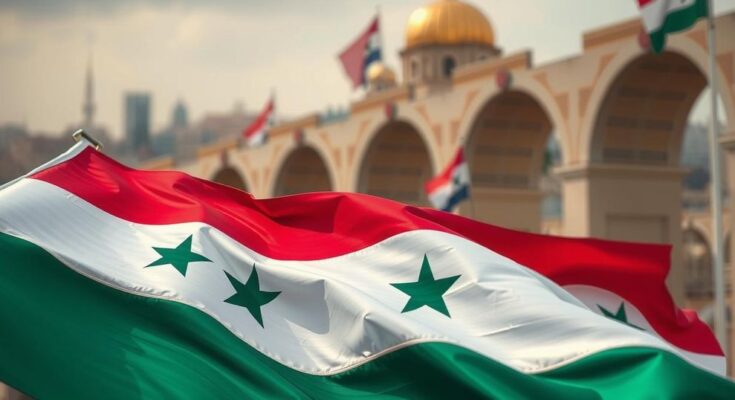The liberation of Syria has sparked widespread celebration and introspection among its citizens following the fall of the Assad regime. Amidst the joy, there exists profound grief for those lost during years of oppression. Hayat Tahrir al-Sham’s leadership appears pragmatic as it seeks an inclusive government, but external threats, including continued foreign occupations and sanctions from Western nations, pose substantial challenges to the country’s newfound freedom and stability.
The recent liberation of Syria, although anticipated, has unfolded in unexpected ways that evoke a spectrum of human emotions among its citizens. Following the removal of the Assad regime, millions have taken to the streets to celebrate newfound freedoms, shedding light on previously silenced truths. Women, once less visible in the public sphere during the conflict, have become prominent participants in the revival of civic life, while families reunite after prolonged absences in exile. However, many face the tragic reality of grieving loved ones believed to have died at the hands of the regime, as mass graves emerge, revealing the horrors endured under Assad’s rule.
The remarkable coordination and strategic discipline of the rebel coalition, particularly under Hayat Tahrir al-Sham (HTS), played a pivotal role in dismantling the regime. The atmosphere in liberated areas has been notably respectful, allowing for the defection of numerous Assad loyalists, particularly as the coalition assured the protection of various communities and upheld social order. The leader of HTS, Ahmed al-Sharaa, despite initial apprehensions regarding his authoritarian potential, has shown a preference for moderation, emphasizing the importance of adaptive leadership to address Syria’s complex societal dynamics.
The HTS has signaled a commitment to inclusivity within the political framework of a transitional government, asserting that diverse ethno-sectarian groups will have their rights safeguarded and that women’s autonomy will not be infringed upon. Mohammad al-Bashir has been appointed as prime minister of the interim government, indicating a focus on technocratic governance while seeking to broaden political representation. However, there is a crucial need for meaningful engagement with all communities during the drafting of a new constitution to ensure stability and prevent potential sectarian conflicts.
While internal developments appear promising, Syria remains beset by external threats, including ongoing occupations by foreign forces. Conflict in the northeast, particularly involving Turkey and the Kurdish PKK, coupled with the presence of troublesome Turkish-backed militias, complicates the nation’s prospects for lasting peace. Furthermore, Western sanctions against Syria persist, raising concerns about economic recovery and sovereignty. Unprovoked incursions by Israel further compromise Syria’s territorial integrity, underscoring the geopolitical challenges that lie ahead for this newly liberated nation.
In conclusion, the liberation of Syria has initiated a complex interplay of hope and challenge as citizens strive toward a democratic future. While internal governance efforts show signs of inclusivity and moderation, significant foreign threats loom that must be navigated. The resilience of the Syrian populace, however, signals a determined pursuit of autonomy and stability, marking a pivotal moment in the nation’s historical trajectory.
The article delves into the aftermath of the Syrian civil war, particularly focusing on the recent liberation from the Assad regime and its implications for the country. It highlights the powerful emotions felt by the population as they begin to reconnect and reflect on the trauma of war. The significant role of the rebel coalition, especially Hayat Tahrir al-Sham, in overthrowing the regime is underlined, along with the importance of establishing an inclusive governmental structure that respects ethnic and sectarian diversities. With ongoing external interventions and foreign hostilities still threatening Syria’s sovereignty, the article provides a comprehensive overview of the challenges and aspirations facing the country as it seeks to establish a new order.
In summary, the liberation of Syria marks a transformative period filled with both hope and uncertainty. The emergence of a more inclusive governance structure, spearheaded by individuals like Mohammad al-Bashir and supported by HTS, offers a foundation for rebuilding society. However, the specter of external threats from foreign powers and ongoing geopolitical tensions poses significant obstacles. Ultimately, the resolve of the Syrian people will be crucial in shaping the country’s future endeavors towards autonomy and stability in the wake of prolonged turmoil.
Original Source: www.theguardian.com




